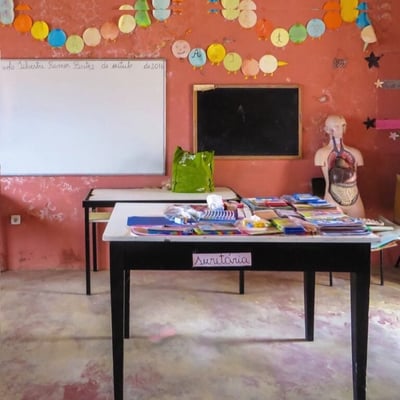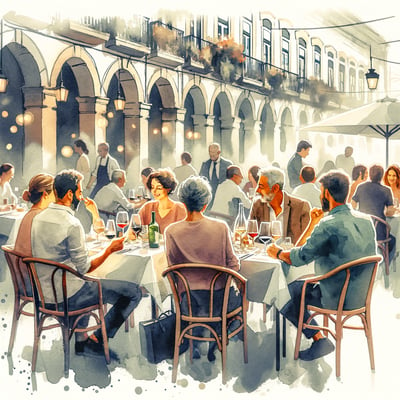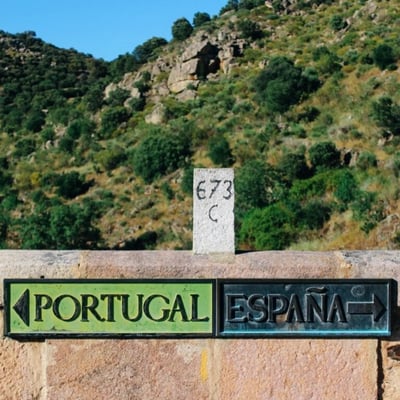1
00:00:01,985 –> 00:00:04,405
Constança: Boa tarde, Joana!
{{Constança: Good afternoon, Joana!}}
2
00:00:04,405 –> 00:00:06,705
Joana: Boa tarde, Constança!
{{Joana: Good afternoon, Constança!}}
3
00:00:06,705 –> 00:00:10,545
Uau, as suas roupas são muito giras.
{{Wow, your clothes are really cute.}}
4
00:00:10,545 –> 00:00:11,725
Constança: São?
{{Constança: They are?}}
5
00:00:11,805 –> 00:00:13,285
Obrigada.
{{Thanks.}}
6
00:00:13,365 –> 00:00:14,705
Joana: De nada.
{{Joana: You are welcome.}}
7
00:00:14,705 –> 00:00:18,725
O seu vestido cor de laranja é muito bonito.
{{Your orange dress is very beautiful.}}
8
00:00:18,725 –> 00:00:20,265
O casaco também.
{{The coat as well.}}
9
00:00:20,265 –> 00:00:23,165
Constança: O casaco é da minha irmã.
{{Constança: It is my sister’s coat.}}
10
00:00:23,265 –> 00:00:27,185
Eu gosto muito dele, mas não tem bolsos!
{{I really like it, but it has no pockets!}}
11
00:00:27,195 –> 00:00:29,075
Joana: Pois, que aborrecido.
{{Joana: Yeah, that is annoying.}}
12
00:00:29,075 –> 00:00:32,905
Constança: A Joana também tem uns sapatos muito bonitos.
{{Constança: You also have very beautiful shoes.}}
13
00:00:32,925 –> 00:00:35,785
Joana: Que querida, obrigada.
{{Joana: How sweet, thank you.}}
14
00:00:35,865 –> 00:00:39,545
Quer dizer, não são sapatos, são botas.
{{I mean, they are not shoes, they’re boots.}}
15
00:00:39,705 –> 00:00:41,505
Eu também gosto muito deles.
{{I really like them too.}}
16
00:00:41,505 –> 00:00:43,884
E da minha mala, gosta?
{{And my handbag, do you like it?}}
17
00:00:43,884 –> 00:00:45,195
Constança: Sim, que gira!
{{Constança: Yes, how cute!}}
18
00:00:45,195 –> 00:00:48,245
Joana: A minha mala é da cor do seu chapéu.
{{Joana: My bag is the colour of your hat.}}
19
00:00:48,245 –> 00:00:50,905
Constança: Sim, e do meu cinto.
{{Constança: Yes, and of my belt.}}
20
00:00:50,905 –> 00:00:52,905
Joana: As suas roupas são ótimas.
{{Joana: Your clothes are great.}}
21
00:00:54,365 –> 00:00:57,665
Está uma rapariga muito bonita, Constança.
{{You are a very pretty girl, Constança.}}
22
00:00:57,675 –> 00:00:59,274
Constança: Obrigada, Joana.
{{Constança: Thank you, Joana.}}
23
00:00:59,274 –> 00:01:00,985
Joana: De nada, de nada.
{{Joana: You are welcome, you are welcome.}}
24
00:01:00,985 –> 00:01:03,785
Peço desculpa, eu tenho um pouco de pressa.
{{I am sorry, I’m in a bit of a hurry.}}
25
00:01:03,794 –> 00:01:04,794
Até amanhã!
{{See you tomorrow!}}
26
00:01:04,794 –> 00:01:06,134
Constança: Até amanhã!
{{Constança: See you tomorrow!}}
 We respect your privacy and have a ZERO TOLERANCE for spam.
We respect your privacy and have a ZERO TOLERANCE for spam.
















Hi! Thank you for your awesome website. I’m very impressed at te structuring if the unit’s – they are just the right length to be “digestible”, the content is interesting, and the interface very easy to use.
One suggestion that popped into my head today:
At the end of each unit you have a list of verbs that are used in that unit.
Could you add a little symbol or note to each verb to signify if it is a “regular” or “irregular” verb (at least in the present tense)?
That way, knowing which verbs are irregular, we can further study/memorize the conjugation of those. It may be obvious from the lesson in the unit but it may not be – a little icon “R” for regular and “IR” for irregular might help. 🙂
Open to hearing from other learners if they agree this would be helpful!
Great stuff! I’m just curious – if these two are friends, why are they using the “você” form?
It’s not unusual for friends of an older age to address each other as “você”. In this case, the implication is not old age, but that they are a certain type of upper-class ladies for whom “você” is actually the default treatment, even with relatives, including children! Joana’s accent, in particular, is a caricature of their manner of speaking. In Portugal, we call these women “tias”, in a depreciative way. The closest equivalent in English would be “posh”. If famous, you could also use the terms “jet set” (also commonly used in Portugal) or “socialite”.
That makes sense, thanks!
This context will help me learn.
Thanks!
In England they might call each other darling
Oh, definitely!
Uau ! Outra vez ótimo =) ! Obrigadíssima !
Love the animation on this one. Way to change it up.
Hi – Slightly curious that ‘I mean’ translates to ‘quer dizer’ and not ‘quero dizer’? What am I missing here?
I think the structure and presentation of the course is excellent and extremely helpful.
If I were to make a suggestion for a small improvement I would ask that the gender of all nouns shown in the vocabulary sections is included for the sake of clarification.
Many thanks
Olá, Jeremy. The translation is more idiomatic rather than literal. “Quer dizer” would literally translate to “it means”, but “I mean” is the closest match in terms of meaning and it’s what people would actually say in English. This way, hopefully, you’ll also have a better sense of how “quer dizer” is used in Portuguese in these contexts. By the way, thanks for your suggestion!
I loved this unit. The vocab based units are so much easier than the
grammer ones.
Might i suggest adding 1 or2 audio clips of sentences NOT previously shown in that lesson? I know I would struggle with such a thing but it would be a greatr test of listening comprehension. Thanks!
Joana says, “Que querida, obrigada. Quer dizer, não são sapatos, são botas. Eu também gosto muito *deles* “.
Shouldn’t it be ‘delas’, since ‘botas’ is a feminine word?
Olá Damla!
You’re actually right. Maybe she just decided to refer to “sapatos” (masculine) instead of “botas” (feminine) in the end, since Constança called them “sapatos”… even though Joana had just corrected the right term for the shoes…
Let’s just assume she was referring to “sapatos” when saying “Eu também gosto muito deles”. If she was referring to “botas” it would have to be “Eu também gosto muito delas” of course.
Cheers,
Luís
Is querida the feminine version of honey or dear? Is there a querido? If so is it used in common conversation? Thanks
Olá Steven!
Yes, yes and yes. 🙂
Querido/Querida is used in the same way someone would use “dear” or “honey”.
Cheers,
Luís
Este podcast é bom e fácil. Eu dizia que é o nível A1